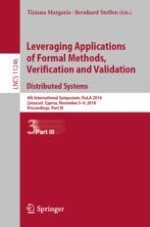2018 | OriginalPaper | Chapter
The Sharer’s Dilemma in Collective Adaptive Systems of Self-interested Agents
Authors : Lenz Belzner, Kyrill Schmid, Thomy Phan, Thomas Gabor, Martin Wirsing
Published in: Leveraging Applications of Formal Methods, Verification and Validation. Distributed Systems
Publisher: Springer International Publishing
Activate our intelligent search to find suitable subject content or patents.
Select sections of text to find matching patents with Artificial Intelligence. powered by
Select sections of text to find additional relevant content using AI-assisted search. powered by
